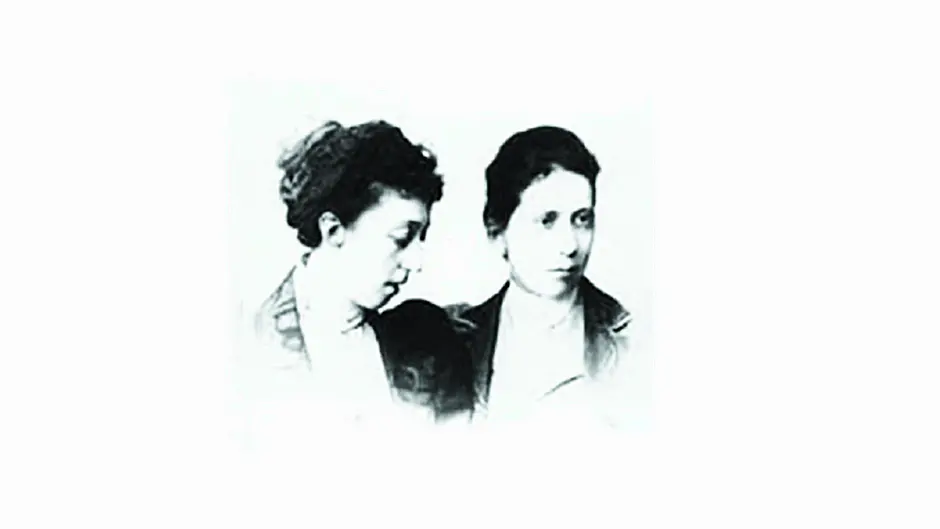Outwardly, they were proper Victorian ladies. But the real Somerville & Ross were rebels who wanted to earn their own living and were enthusiastic about what a disapproving Queen Victoria called ‘the strange infection of feminism'
By Martina Devlin
EDITH Somerville and Violet Martin, better known as the enormously successful writing duo Somerville and Ross, were born into two Ascendancy families. The Somervilles of CastleTownshend and the Martins of Oughterard in Co Galway were connected by blood – Edith and Violet were second cousins.
Their writing partnership extended over a 26-year period when they jointly published five novels, three volumes of Irish RM stories, as well as travel pieces, with Edith continuing to write under the dual signature after Violet’s death in 1915.
They are among a group of ground-breaking women fictionalised in my latest book, Truth & Dare, a collection of short stories bringing to life some of the extraordinary women who helped to shape modern Ireland. By translating their lives into fiction, I hoped to humanise them.
The Somerville and Ross story shows them in the act of drawing literary inspiration from the humour and vivid turn of speech used by the country people they lived among.
The pair met in CastleTownshend in 1886 when they were in their twenties and hit it off immediately.
Edith later calling the meeting ‘a hinge, the place where my life and hers, turned over’. I’ve been lucky enough to spend time in Drishane House, thanks to the kindness of owners Tom and Jane Somerville, reading their archive. It’s clear that Somerville and Ross were acute observers with an irrepressible sense of humour.
To fellow writer Molly Keane, they were forerunners in trying to escape the rigid limitations of class and era – Edith compared a lady’s life to being ‘in a cage’.
Both Somerville and Ross belonged to an early women’s franchise league and canvassed on behalf of candidates in England in the 1880s, as soon as it was legal for women to do so. They became more active after 1908 when they heard Christabel Pankhurst speak at a suffrage rally in London’s Hyde Park.
By the following year, Edith Somerville was president and Violet Martin vice-president of the Munster Women’s Franchise League.
This was a non-militant organisation which lobbied for electoral change as opposed to the civil disobedience tactics of suffragettes. However, Edith noted that suffragettes who went on hunger strike and were force-fed showed courage and loyalty to one another.
Political parties saw women’s suffrage as a divisive issue and none would adopt the cause.
This was at a time when the notion of female autonomy was ridiculed by the majority of people, other women included. Why should a woman even care about earning her living when a husband, father or brother had a duty to look after her? Many people were mystified by the notion that self-respect and self-determination might be factors.
Somerville and Ross took their work seriously as professional writers. As early as 1893 Edith complained in a letter to her sister Hildegarde about their cousin Herbert Green, Edith’s suitor: ‘I must say he riles me awfully in his persistently ignoring that I have any work to do.’ She was busy with The Real Charlotte, often described as the best Irish novel of the 19th century.
They had one of the first literary agents, James Pinker, whose client list was a who’s who: Henry James, Oscar Wilde, Joseph Conrad, DH Lawrence and James Joyce. Virginia Woolf called her dog Pinker.
Other Cork women fictionalised in the Truth & Dare collection include Nano Nagle, a pioneer of learning for girls and poor people. Nano put her life on the line to educate children during penal times and founded the Presentation nuns who continue her work today.
Kanturk-born Hanna Sheehy Skeffington features in another story. She was the pre-eminent Irish feminist of the 20th century and co-founder, with Margaret Cousins, of the Irish Women’s Franchise League – a militant group. For them, the vote was the cornerstone of democracy and a vital part of citizenship.
A century ago, in December 1918, some women finally won the right to vote: those over 30 who fulfilled property qualifications or had a university degree. It was a start.
Future generations benefited from the determination of Somerville and Ross, Hanna Sheehy Skeffington and Nano Nagle – their activism is the reason women today have the vote, access to education and the professions.
And thanks to Somerville and Ross, we also have books about Irish life which are still being read more than a century later. As their agent Mr Pinker told them: ‘You write the real Ireland down as no one else does.’
Truth & Dare: Short Stories About Women Who Shaped Ireland, by Martina Devlin, is published by Poolbeg.









